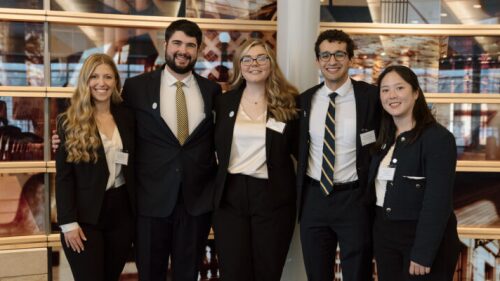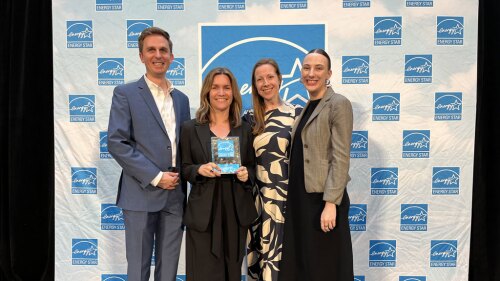The former mill city of Lowell, Massachusetts, received a major boost in ongoing efforts to transform into a center of innovation when Kronos—a homegrown Massachusetts workforce management software and services company—decided to relocate its global headquarters, taking a half-million square feet (46,500 sq m) close to the city’s revitalized downtown. As is often the case in site selections of this kind, the deal was a collaborative effort involving the private sector, state and local governments, and institutions of higher education.
“You can’t do a project like bringing a Kronos into Lowell without public assistance. There’s just no way around it,” says David Nangle, the state representative from Lowell who was a key player in the move. “It was a coup for the city of Lowell, but it took a total team effort from the beginning to the end.”

Kronos was founded in Lowell in 1977 before setting up its time clock–manufacturing operations in the Boston borough of Brighton. Kronos developed a web-based product in 1998 that established the company as a leader in the workforce management industry, and in recent years, it has invested heavily in mobile, cloud-based solutions.
A full-court press by Lowell and the commonwealth of Massachusetts (including large tax incentives), a desire on the part of the employer to remain imbedded in the region where they had cultivated their talent, and a proactive approach by the city, state, and the public colleges to reposition Lowell as a center of innovation in recent years, combined to land a firm whose presence should have a ripple effect on the economic development of this gateway city for years to come.
Kronos was founded in Lowell in 1977 before setting up its time clock–manufacturing operations in the Boston borough of Brighton. Kronos developed a web-based product in 1998 that established the company as a leader in the workforce management industry, and in recent years, it has invested heavily in mobile, cloud-based solutions. It continues to grow, with over 5,000 employees worldwide and 2016 revenue exceeding $1.2 billion.
Kronos had relocated its operations to the northern Boston suburb of Chelmsford (which borders Lowell) in 2000, expanding into 322,000 square feet (29,900 sq m) in three buildings by 2012. The company was contemplating expansion into a fourth building before deciding to explore other options that would unite its corporate headquarters employees under one roof. Of paramount importance in the decision-making process was the need to maintain the company’s existing local workforce while also being able to attract additional tech talent from the region.
Options for a 500,000-square-foot (46,500 sq m) campus in the immediate area were limited, and staying put remained a possibility when Kronos began to strongly consider Crosspoint, a three-building, 1.2 million-square-foot (111,500 sq m) facility that was constructed for Wang Laboratories in the early 1980s. The campus was purchased by investor Anchor Line Partners in 2014 for $100 million at a time when occupancy had declined to 60 percent, and the campus “was clearly in need of a turnaround,” according to founder and managing partner Andrew Maher. A value-add investor, Anchor Line spent $15 million in amenities and upgrades, including a new daycare center, substantially increasing the appeal of the campus.
At the urging of its leasing broker (Cushman & Wakefield), Kronos hired April Anderson of Anderson Strategic Advisors to help with the process, including accessing tax incentives. Anderson has worked as a ULI Rose Center fellow, and previously worked in Massachusetts government for nearly two decades, serving as assistant secretary for economic development in her last position under former governor Deval Patrick. She worked closely with the city of Lowell city manager Kevin Murphy as well as Massachusetts Secretary of Housing and Economic Development Jay Ash, bringing them into the conversation with Kronos early in the process. Ash says he felt strongly “that it was important for the commonwealth to keep this homegrown global innovation leader growing in Massachusetts,” and set out to make it happen.
Working with the state’s Economic Assistance Coordinating Council, Kronos received an $8 million state tax credit to assist with the move from Chelmsford to Lowell (with the promise that it would create 400 new jobs by 2022), and also received an additional $4.9 million in tax increment financing (TIF) from the city of Lowell.
“With tax incentives, it’s generally been my experience that the public often feels that corporations shouldn’t be receiving them, but what I’ve found more times than not is that the companies take those incentives and reinvest the tax savings into the project. And that’s exactly what happened here with Kronos,” Anderson says. Kronos had already added nearly 200 jobs prior to the move-in date, which was completed in mid-September.
The tax incentives offered by Lowell came with a clawback provision that allows the city to cancel the agreement and recoup the savings earned through the TIF if objectives are not met, according to Allison Lamey, economic development director for the city of Lowell. “We really worked closely with the property owner as well as Kronos, and the agreement will also result in $2.9 million in new taxes over the length of the TIF [12 years, the length of the lease],” says Lamey.
The agreement with Kronos also contains language that requires that the company work with local schools University of Massachusetts at Lowell (UMass Lowell) and Middlesex Community College and make a concerted effort to hire local residents. Kronos currently employs over 250 UMass Lowell alumni, a byproduct of the state’s investment in technology programs offered by the schools, such as UMass Lowell’s Innovation Hub, which opened in 2015 and affords 22,000 square feet (2,000 sq m) of coworking space to early-stage entrepreneurs to test products and concepts.
Lamey’s office also created another incentive for Kronos employees, developing a program with the nonprofit Lowell Development & Financial Corporation that incentivizes employees buying their first Lowell home, regardless of income, to encourage them to move there. “We don’t just want a company to move here—especially Kronos, where their employees are earning a higher wage—we want the people to choose to live here, because that helps to grow our local economy.”
Murphy, who was lauded by both Kronos’s brass and Anchor Line’s Maher for his expedited permitting process and overall responsiveness, says that offering Kronos the tax package was a sound business decision for two reasons: “One, you’re attracting 2,000 jobs to the city of Lowell, and those people will help out our economy with their purchasing power; and second, just by having Kronos locate in one section of Crosspoint makes the rest of the building that much more valuable [occupancy now stands at 96 percent]. And the tax revenue for the rest of the building serves as an offset to the tax incentive plan that we offered Kronos. I hate the term ‘win/win,’ but it certainly was for Kronos and the city of Lowell.”
Vince Devlin, chief procurement officer at Kronos, says that in addition to the incentives, Secretary Ash really sold Kronos on his economic vision for Massachusetts, particularly the gateway cities. “His point of view was that Kronos could help put Lowell over the top . . . and he really impressed upon us how important that was to Massachusetts,” says Devlin.
The decision was also a practical one, since relocating to Boston, Cambridge, or one of the suburban tech hubs such as Waltham and Burlington would not only mean a doubling or tripling of rent, but “we would also be feeding in a much larger pool, competing for the same tech talent. Strategically being removed from [those markets], we’re a much bigger fish in a smaller pond, but the pond is stocked with some really talented individuals,” admits Devlin. “The company made a very conscious effort to stay in this area because we have a very tenured staff [who] moved here, married, bought a home, raised their kids, and we wanted to be sure that we acknowledged that through our selection of real estate.”
The move should prove to be an enormous boost to Lowell, which is developing into a viable urban living alternative to the pricey Boston and Cambridge markets. “We’re not the mill city anymore, we’re an innovation hub,” says Nangle. “We have theater, a wide variety of ethnic restaurants, museums, and the Spinners [a Boston Red Sox minor league affiliate], so there’s a quality of life that I think people will be attracted to.”





